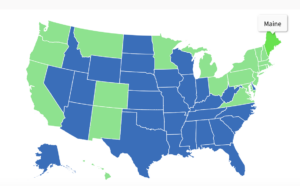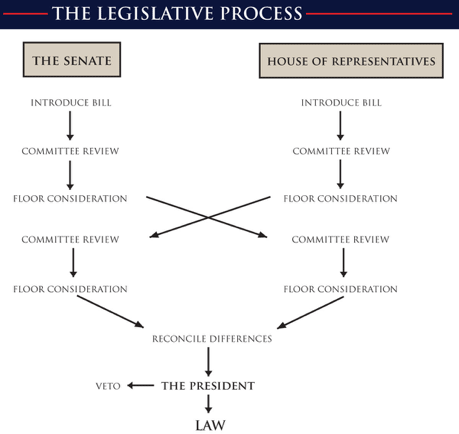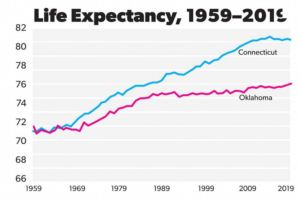LEGISLATION
Do choices at the ballot box make life & death differences for us?
Yes. Reforms work. See below.
Single Payer/Expanded and Improved Medicare For All
CURRENT SP FEDERAL LEGISLATION – 119th Congress, 2025-2026
- U.S. House of Representatives: HR 3069: formally titled “To Establish An Improved Medicare For All National Health Insurance Program“, introduced by Representative Pramila Jayapal, WA, on April 29, 2025, with 106 original co-sponsors.
- Official government page: https://www.congress.gov/bill/119th-congress/house-bill/3069
- PNHP.org overview and section by section summary of the bill https://pnhp.org/the-medicare-for-all-act-of-2025/ [will be updated on PNHP soon]
- Senate bill: S 1506, Medicare for All Act of 2025, introduced by Sen. Bernie Sanders (VT), was filed April 29, 2025, with 16 co-sponsors. It would establish a publicly-funded national health program that would guarantee comprehensive, high-quality care for all residents of the United States.
- Official government page: https://www.congress.gov/bill/119th-congress/senate-bill/1506
- PNHP Analysis:https://pnhp.org/the-medicare-for-all-act-of-2025/ [PNHP to update soon]
- Check names and districts of co-sponsors to see if yours are among them: https://www.congress.gov/bill/119th-congress/house-bill/3069/cosponsors or https://www.congress.gov/bill/119th-congress/senate-bill/1506/cosponsors
- Video of Town Hall introducing the Medicare for All Acts of 2025. Representatives Jayapal and Dingell, Senator Bernie Sanders, and patient and provider advocates https://www.youtube.com/watch?v=PZ0UQVOtSTQ&t=93s
FEDERAL LEGISLATION to Combat Misleading Advertising by Corporate “Medicare”
(Overview of the problem being addressed: So-called “Medicare Advantage”–from PNHP ProtectMedicare.Net. Note that this bill will likely not be re-introduced. Still, it remains a good commentary on one of the sources of ongoing problems with “alternate private health plans” that dress themselves up as true Medicare–but they are not! That is, private companies are given the Medicare money to take care of the seniors they enroll, but then get to keep what they don’t spend. Thus, they have the incentive to skimp on, and flat-out deny, coverage on a very arbitrary basis.
- U.S. House Bill HR 732, informally titled “The Save Medicare Act”, introduced by Representatives Mark Pocan (WI), Jan Schakowsky (IL), and Ro Khanna (CA), February 1, 2023, with 20 original co-sponsors. The act renames Medicare Advantage (MA) the “Alternative Private Health Plan” (no-longer “Part C”) and penalizes unauthorized use of the Medicare “brand”–its name, logos, etc. It also establishes $100,000 civil penalties for each instance of advertising by non-government plans that continue to use “Medicare” in the title
- Official government page https://www.congress.gov/bill/118th-congress/house-bill/732/
- List of co-sponsors https://www.congress.gov/bill/118th-congress/house-bill/732/cosponsors
- Infomercial by sponsors. https://www.youtube.com/watch?v=mzVQgFNTr1g
- Related material on new HHS guidelines
- AARP report of changes due Sept. 30, 2023
- HCR4US Newsletters on topic: March 2023, June 2023
PREVIOUS Federal Legislation, 116th/ 117th Congress, 2019-2020/ 2021-2022
- House bill HR 3421: Medicare for All Act of 2023
- House bill HR 1976: Medicare for All Act of 2021
- House bill HR 1384: Medicare for All Act of 2019
- Senate bill S1655: Medicare for All Act of 2023
- Senate bill S4204: Medicare for All Act of 2022
- U.S. Senate, S 1129: Medicare for All Act of 2019, introduced by Senator Bernie Sanders, VT.
- NOTE: Point-by-point comparison of the House and Senate bills HR 1384 & S 1129: The Kaiser Family Foundation (KFF) provides an interactive website where you can put the two bills side by side to see where they are consistent and in which areas they differ.
STATE-BASED ADVOCACY
- Winning federal support for individual states (or groups of states) to achieve universal health care within their borders has emerged as a companion to the national Medicare for All campaign. Advocates for state-based programs usually favor a national plan, but they see state-based alternatives as stepping stones to a national plan. A State-based Universal Health Care bill (SBUHC HR 5010) was introduced in 2018 (and HR3775 in 2021) to strengthen waivers allowed by Section 1332 of the ACA and pave the way for funding and authority to make state-based Medicare for All/Single Payer legislation easier to implement. Read more…
- U.S. House, HR 6270: the State-Based Universal Health Care Act of 2023, introduced by Rep. Ro Khanna, CA, with 27 co-sponsors. https://www.congress.gov/bill/118th-congress/house-bill/6270/text
- This bill facilitates state waivers to make state-based plans more viable. Summary and FAQs. It establishes the option for states, or groups of states, to apply to waive certain federal health insurance requirements and provide residents with health insurance benefits plans through a state-administered program. Such programs must cover 95% of the residents in the state within five years and plan benefits must be at least as comprehensive and affordable as the coverage under the equivalent federal program.
- U.S. Senate S4817: the same exact bill. It was introduced in the 118th Session, March 20, 2024 by Senator Ed Markey, MA. Like the House bill, it will establish a “super-waiver” that strengthens the basis on which state-based Medicare for All bills receive federal funds and makes them better able to withstand challenges in the courts. The preliminary text is here.
- A “field hearing” launched it April 3, 2024 at the Massachusetts State House on Beacon Hill. It is archived at https://www.help.senate.gov/ (“HELP” is the Health, Education, Labor and Pensions Committee, chaired by Sen Bernie Sanders (VT). Senator Markey is a subcommittee chair within HELP.)
- U.S. House, HR 6270: the State-Based Universal Health Care Act of 2023, introduced by Rep. Ro Khanna, CA, with 27 co-sponsors. https://www.congress.gov/bill/118th-congress/house-bill/6270/text
- For state-based M4A plans, see One Payer States website. Also see Medicare for All Coalition of States Facebook page

Green states have pending legislation or advocacy infrastructure for State-based Universal Health Care (SBUHC). Link to the One Payer States website to see state profiles.
THE LEGISLATIVE PROCESS:
- A bill must be passed by both the House and Senate in identical form and then be signed by the President to become law.
- Bills numbers restart every two years. That means there are other bills with the same number(s) (such as H.R. 1976), so when researching a bill, you need both the bill number and the correct congressional year.
- For an informative 4-minute fun chuckle to see how a bill can get stuck in committee (from the bill’s point of view), take a look at what California is going through with SB5632…and enjoy singing along. https://drive.google.com/file/d/1YzCOy49BJybiu6wewrn60j6Oj0h6971O/view

COMPARING LIFE and DEATH in OUR POLICY CHOICES
Princeton Professor Paul Starr‘s article in the American Prospect (12.8.2023), “The Life-and-Death Cost of [Political Choices],” describes the 64-year-long “natural experiment” involving 50 states with opposing policies. The contrasts concern public health, taxes, the stinginess or generosity of public benefits, unionization, gun safety, and many other things that affect [our] well-being. The effect is shown most dramatically by life expectancy patterns by state according to their legislative choices over time.

The data from the experiment support the view that policies designed to save lives–do save lives. What does that mean for the reasoning–and the consciences–of policy-makers who think reform efforts are futile? Read the article.


